Saadia Ashraf, pioneering transition from national team player to coach
Ashraf first female to transition from national team player to coaching staff
Photo credit: WWC 2013 Finland
By: Ameeta Vohra
As Team Canada steps onto home field in late June to compete at the 2017 International Federation of American Football (IFAF) Women’s World Championships, history has been already made off the field.
With Saadia Ashraf’s appointment as the team’s quarterbacks coach, she is the first women’s national team program alumni to join the coaching staff in a full capacity. Ashraf follows in the footsteps of Tannis Wilson who served as the national team’s defensive line coach at the inaugural Women’s World Championship in 2010.
Pioneering a path for women to enter the national team coaching ranks, Ashraf is humbled but appreciative of achieving this major feat in her career.
“It’s hard to describe in words what that means,” she said of her appointment to the national team coaching staff. “First of all, it was a huge honour to be chosen.”
“I think it’s important and significant… it’s something more than a mentor-coach,” she said, as Shirley Benson and Cheryl O’Leary became the first two women to join the coaching staff in 2013 as mentor coaches. “It’s nice that they feel confident enough to choose me.”
Ashraf comes with a wealth of experience to the position. Her first experience with the sport was with touch football during her high school and CEGEP years. In 2000, the quarterback legend was introduced to the Women’s Professional Football League (WPFL).
“There were about eight of us from Montreal that would travel down to Rochester to play on a team called the Rochester Galaxy,” she recalled about the United States based league. “We would travel and we would try to go to practices as much as we could.”
“When school starts for me because I am a teacher, we would go once a week and the season was in the fall. We would travel anyway, just the eight of us, to go down there and play. For me, it was a natural next step to advancing my skills and become more of a full football player.”
After her introduction to the game, Ashraf never looked back, joining the Montreal Blitz in the early 2000’s. She led the Blitz to three Independent Women’s Football League (IWFL) Championships (2008, 2010 and 2012). Between the 2010-2012 seasons, Ashraf steered the Blitz to consecutive undefeated seasons. Overall, she helped the Blitz achieve a 36-4 winning record from 2008-2012.
Moreover, the quarterback great led Team Quebec to gold (2012) and silver (2013) medals at the Canadian Women’s National Championships. Ashraf also guided Team Canada to a pair of silver medals (2010, 2013) at the first two IFAF Women’s World Championships.
From player to coach
In 2015, Ashraf made the transition from a starting pivot to a coach with the Blitz. Currently, she serves as an offensive coach as well as Team President.
The national team is excited to see its first alumna make the transition from player to coach.
“Her football resume both as a player and coach is impressive – 14 years as a quarterback playing American football including two world championships,” said Canada’s head coach, Jeff Yausie of Ashraf. “Her passion for the game of football along with the respect she has earned across the country will help prepare our quarterbacks for the challenge ahead.”
Yausie brought Ashraf onboard based on the unique qualities she possesses as well as the impact she will have on the host nation’s players.
“Quarterback is a position where talent only takes you so far,” he added. “An experienced coach like Saadia will be able to help our players with quarterback intangibles such as leadership, humility, mental toughness and the ability to stay calm under pressure.”
As a female coach, Ashraf understands the challenges female players face.
“Women have a bit of a disadvantage … because they usually start (playing) later and I think sometimes coaches don’t understand that,” she explained.
For the most part, female players are coached by males with playing and coaching experience including minor, high school, junior or university and sometimes even professional experience.
“I think something they forget as coaches sometimes is that (female players) often haven’t played as long as them. We haven’t been exposed as long as they have at that level,” she explained.
“As players, I think we have just that physical challenge of learning how to do those athletic moves of tackling and even running with the ball (which) is different than other sports. It takes a little while as an adjustment. The guy approach is to remember they’re athletic and at an elite level but we have to remember that we have to coach them (women) a little bit different. They (coaches) have to change their mentality a little bit.”
Even though she has over 20 years of experience coaching flag football, there are times Ashraf questions if she’s taken seriously coaching tackle football. However, confidence has been her guiding force to success.
“When it comes to tackle football, I think that’s one of the more mental and emotional or psychological challenges I face myself,” she reflected. “At the same time, I have to realize, I have to be confident in my abilities and confident in what I know that I can bring to the team as a coach.”
“If I have something to say, I am going to say it. I can’t hold back in giving my opinion and my two cents in that aspect. I think that is one of the challenges all female coaches in a new field might think because they’re surrounded by people that have (more) coaching and playing experience.”
Motivated to succeed
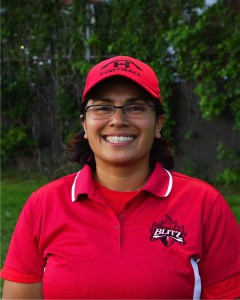 Considered a pioneer, builder and role model, Ashraf is humbled by the praise. However, she is motivated and determined to aim even higher when it comes to reaching her goals.
Considered a pioneer, builder and role model, Ashraf is humbled by the praise. However, she is motivated and determined to aim even higher when it comes to reaching her goals.
“The reason I got involved in the management position with the Blitz is because I want women to play football; it’s a fantastic team sport,” she emphasized. “I think it brings a lot in someone’s life and especially in women’s lives.”
“It takes all kinds, every single body type and everyone can have a place on a football team. It gives 11 or 12 of you at a time that are trying to do one thing, stuff like that just boggles my mind with the strategy behind it. My goal is women should always play this sport and everyone has to be involved in it. If that’s what I am helping to do in whatever small way I can, then that’s great.”
With her new role, Ashraf hopes to pave the way for more women to take the leap into the coaching ranks.
“I think it’s important and what I am hoping is that it will be a trend in not only do we need female coaches to be coaching women, but that women can coach guys too if they’re qualified,” she expressed. “Hopefully, it will open some doors and show some women that, ‘okay, it’s an option for me as well and I want to pursue this whether it’s coaching women or men.’”
“It’s about the knowledge of the game and what you can bring to a team.”
When Canada opens the tournament on June 24, the host nation will face tournament newcomer Australia — led by Dr. Jen Welter, another pioneer of female coaching with tournament playing experience. The pair will help inspire and pave the way for future female coaches.
About the author
Ameeta is a freelance sports and news journalist based in Halifax. During her career, she has covered many sporting events including the 2016 Rio Summer Olympic Games, Vanier Cup, Uteck Bowl, Football Canada Cup, CFL Draft and NCAA Signing Day. Follow her on Twitter @vohra_ameeta
This post is also available in: French


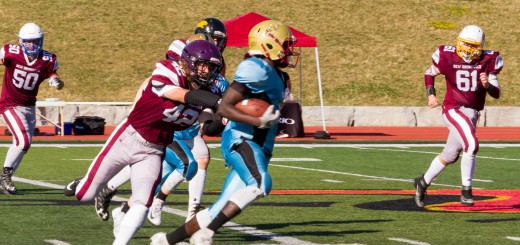
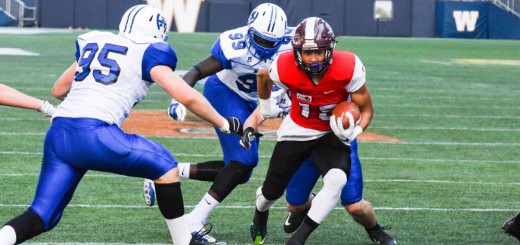

















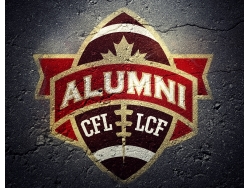
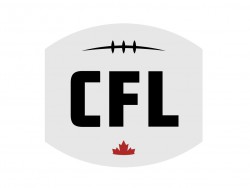
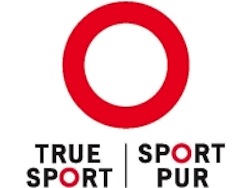












 Check your NCCP Certification
Check your NCCP Certification